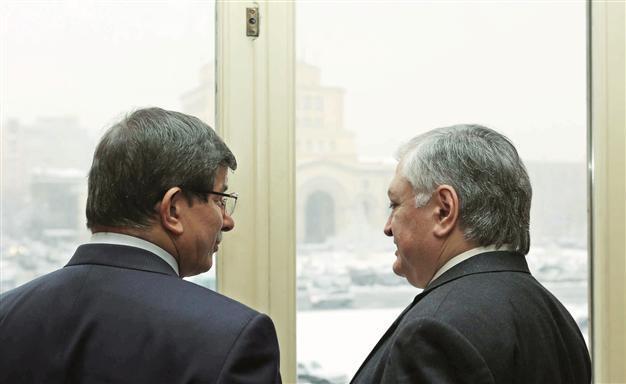Turkey mulls ‘bold steps’ of Armenia to begin ‘new era’
ISTANBUL

Turkish Foreign Minister Ahmet Davutoğlu (L) is seen with his Armenian counterpart Edward Nalbandian in this file photo. ‘The future of Turkey-Armenia relations, peace and stability in the South Caucasus, and Turkish-Armenian relations wherever they live in the world is extremely important,’ Davutoğlu writes. AA Photo
Foreign Minister Ahmet Davutoğlu has stated that Turkey believes Armenia and the Armenian diaspora will choose to take “bold steps” like the one Prime Minister Recep Tayyip Erdoğan took in April, adding that if this happens Turkish-Armenian relations will enter a “new era.”Erdoğan issued Turkey’s first-ever statement offering condolences to the descendants of slain Ottoman Armenians in April, just a day before the traditional 99th anniversary of the mass killings at the hands of the Ottoman Empire during World War I. The statement highlighted the “shared pain” endured during the 1915 events and expressed condolences on behalf of the Turkish state to the grandchildren of Armenians who lost their lives “in the context of the early 20th century.”
In an article published in the spring edition of the Turkish Policy Quarterly journal, Davutoğlu wrote that Erdoğan’s statement should be the foundation for further steps. “Erdoğan’s message of condolence should not be seen as a conjunctural step. It should be seen as a prelude for transformation of minds and memories because this is not only an offer of condolence but also a sincere invitation to all parties to ensure a common future based on lasting peace,” he wrote.
“A new and more grounded era of peace will reign between Turkey and Armenia if intellectuals and politicians do their part to overcome the psychological barriers on both sides and to build a ‘just memory. Otherwise, both sides will inevitably be exploited by those who benefit from a sector that feeds off the status quo,” he wrote. Turkey and Armenia signed a protocol in 2009 to restore diplomatic relations,” Davutoğlu added.
“The greatest injustice that has been visited on both history and the peoples in question is setting aside the shared history of the two peoples and the previous rich centuries, and beginning instead only with traumatic events like war and conflict, or reconstructing the previous centuries by making these traumatic events the center of everything,” he also wrote.
“The ‘unjust memory’ created around the events of 1915 constitutes the most important example of this phenomenon as it mortgages the shared past and future of the Turks and Armenians,” he added, urging open and continuous dialogue between the two sides.
“The ‘just memory’ concept that we have frequently employed during this process is critically important. In order for Turks and Armenians to understand what each of them has experienced, it is essential that they respect one another’s memory. For the Armenians, 1915 was a year of relocation during which exceedingly great tragedies took place. The years prior to and after 1915 were also a time of tremendous tragedy for the Turks in Anatolia. It was at this time that Turks fought for their very survival in the Balkan Wars, at Çanakkale, and in the War of Independence. Actually, this was a time of ‘shared pain,’” Davutoğlu wrote.
















